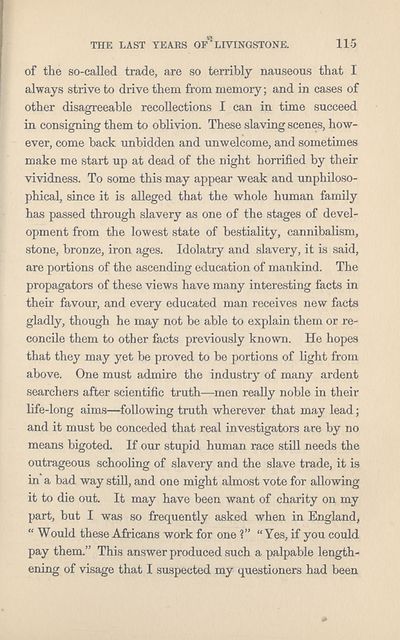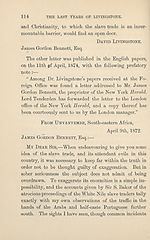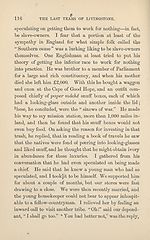Download files
Complete book:
Individual page:
Thumbnail gallery: Grid view | List view

THE LAST YEARS OF LIVINGSTONE.
115
of the so-called trade, are so terribly nauseous that I
always strive to drive them from memory; and in cases of
other disagreeable recollections I can in time succeed
in consigning them to oblivion. These slaving scenes, how¬
ever, come back unbidden and unwelcome, and sometimes
make me start up at dead of the night horrified by their
vividness. To some this may appear weak and unphiloso-
phical, since it is alleged that the whole human family
has passed through slavery as one of the stages of devel¬
opment from the lowest state of bestiality, cannibalism,
stone, bronze, iron ages. Idolatry and slavery, it is said,
are portions of the ascending education of mankind. The
propagators of these views have many interesting facts in
their favour, and every educated man receives new facts
gladly, though he may not be able to explain them or re¬
concile them to other foots previously known. He hopes
that they may yet be proved to be portions of light from
above. One must admire the industry of many ardent
searchers after scientific truth—men really noble in their
life-long aims—^following truth wherever that may lead;
and it must be conceded that real investigators are by no
means bigoted. If our stupid human race still needs the
outrageous schooling of slavery and the slave trade, it is
in a bad way still, and one might almost vote for allowing
it to die out. It may have been want of charity on my
part, but I was so frequently asked when in England,
“ Would these Africans work for one ?” “ Yes, if you could
pay them.” This answer produced such a palpable length¬
ening of visage that I suspected my questioners had been
115
of the so-called trade, are so terribly nauseous that I
always strive to drive them from memory; and in cases of
other disagreeable recollections I can in time succeed
in consigning them to oblivion. These slaving scenes, how¬
ever, come back unbidden and unwelcome, and sometimes
make me start up at dead of the night horrified by their
vividness. To some this may appear weak and unphiloso-
phical, since it is alleged that the whole human family
has passed through slavery as one of the stages of devel¬
opment from the lowest state of bestiality, cannibalism,
stone, bronze, iron ages. Idolatry and slavery, it is said,
are portions of the ascending education of mankind. The
propagators of these views have many interesting facts in
their favour, and every educated man receives new facts
gladly, though he may not be able to explain them or re¬
concile them to other foots previously known. He hopes
that they may yet be proved to be portions of light from
above. One must admire the industry of many ardent
searchers after scientific truth—men really noble in their
life-long aims—^following truth wherever that may lead;
and it must be conceded that real investigators are by no
means bigoted. If our stupid human race still needs the
outrageous schooling of slavery and the slave trade, it is
in a bad way still, and one might almost vote for allowing
it to die out. It may have been want of charity on my
part, but I was so frequently asked when in England,
“ Would these Africans work for one ?” “ Yes, if you could
pay them.” This answer produced such a palpable length¬
ening of visage that I suspected my questioners had been
Set display mode to:
![]() Universal Viewer |
Universal Viewer | ![]() Mirador |
Large image | Transcription
Mirador |
Large image | Transcription
| Antiquarian books of Scotland > Scotland/Scots > Last years of Livingstone > (123) |
|---|
| Permanent URL | https://digital.nls.uk/136058638 |
|---|
| Description | Thousands of printed books from the Antiquarian Books of Scotland collection which dates from 1641 to the 1980s. The collection consists of 14,800 books which were published in Scotland or have a Scottish connection, e.g. through the author, printer or owner. Subjects covered include sport, education, diseases, adventure, occupations, Jacobites, politics and religion. Among the 29 languages represented are English, Gaelic, Italian, French, Russian and Swedish. |
|---|

